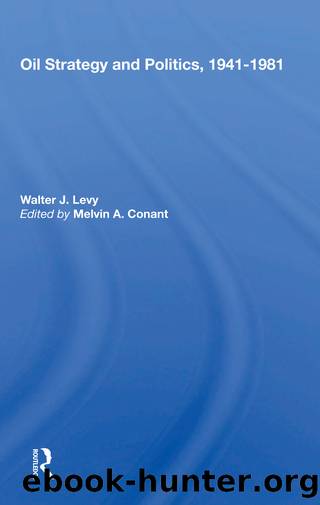Oil Strategy and Politics, 1941-1981 by Walter J. Levy

Author:Walter J. Levy [Levy, Walter J.]
Language: eng
Format: epub
Tags: Political Science, General
ISBN: 9780429704970
Google: ICyNDwAAQBAJ
Goodreads: 44598118
Publisher: Routledge
Published: 1982-01-01T00:00:00+00:00
Oil and the Task of Private Enterprise
Bearing the Risk. A basic function of private enterprise in undertaking investment is that it bears the risk of failure while anticipating the rewards of success. As already noted, uncertainty is inherent in oil exploration, and the incidence of failure is high relative to success. But each instance reflects an individual company's evaluation of oil-bearing potential and production prospects. Thus, the worldwide explorations of the international petroleum industry encompass the individual decisions of a large and growing number of firms.
Two factors that are essential to a successful search for oil are thus brought into playâdiversification of judgment and technical competence drawn from wide experience. Diversification of judgment is essential if prospects are not to be rejected or pursued on the basis of a single evaluation, especially since evaluation of oil-bearing potential rests on so many geological and geophysical considerations, each subject to a multitude of interpretations. It is the very multiplicity of judgments within the oil industry that provides the broad scope and intensive effort entering into world exploration. Technical competence reflects the training and experience that is built up only in the course of repeated operations in many areas and under all possible conditions. Past failures, as well as successes, have contributed to a fund of technical knowledge: and each new area that is opened to exploration benefits from previous experience.
Financing Oil Operations. On the financial side, I would stress two vital contributions of private enterpriseâin providing essential capital and subsuming foreign exchange costs. As noted earlier, the flow of capital required to finance oil operations is very large indeed. Within the international oil industry, funds generated in the course of established operations provide for replacement and expansion. They also flow into the exploration of new areas; and they support the development of resources and construction of facilities until these can become self-financing. In effect, world-wide operations of the industry enable companies to draw on their earnings in established areas to finance exploration and development elsewhere.
At the same time that the flow of private investment in the course of international oil operations serves to supplement national funds in capital-short countries, it provides essential foreign exchange for machinery and equipment imports where international payments positions might otherwise be adversely affected. On both counts, private operations enable a country to benefit on a scale that neither its own capital nor foreign exchange resources might permit.
Many instances can be cited by way of illustration. I would here note briefly the experience of two countries that have recently been opened to exploration by private companies. The contribution of private enterprise in these cases should be measured according to the investment and physical effort being made; the results have been quite different-which is part of the point of the story.
In 1955, Guatemala enacted an oil code conducive to foreign investment in exploration. By mid-1959, concessions had been granted to more than 30 companies, covering more than two-fifths of the national territory. More than $50 million has been spent by these companies in Guatemala over the past five years.
Download
This site does not store any files on its server. We only index and link to content provided by other sites. Please contact the content providers to delete copyright contents if any and email us, we'll remove relevant links or contents immediately.
What's Done in Darkness by Kayla Perrin(25493)
Shot Through the Heart: DI Grace Fisher 2 by Isabelle Grey(18209)
Shot Through the Heart by Mercy Celeste(18153)
The Fifty Shades Trilogy & Grey by E L James(17768)
The 3rd Cycle of the Betrayed Series Collection: Extremely Controversial Historical Thrillers (Betrayed Series Boxed set) by McCray Carolyn(13182)
The Subtle Art of Not Giving a F*ck by Mark Manson(12898)
Scorched Earth by Nick Kyme(11823)
Stepbrother Stories 2 - 21 Taboo Story Collection (Brother Sister Stepbrother Stepsister Taboo Pseudo Incest Family Virgin Creampie Pregnant Forced Pregnancy Breeding) by Roxi Harding(11019)
Drei Generationen auf dem Jakobsweg by Stein Pia(10211)
Suna by Ziefle Pia(10179)
Scythe by Neal Shusterman(9251)
International Relations from the Global South; Worlds of Difference; First Edition by Arlene B. Tickner & Karen Smith(8600)
Successful Proposal Strategies for Small Businesses: Using Knowledge Management ot Win Govenment, Private Sector, and International Contracts 3rd Edition by Robert Frey(8407)
This is Going to Hurt by Adam Kay(7682)
Dirty Filthy Fix: A Fixed Trilogy Novella by Laurelin Paige(6445)
He Loves Me...KNOT by RC Boldt(5798)
How to Make Love to a Negro Without Getting Tired by Dany LaFerrière(5369)
Interdimensional Brothel by F4U(5299)
Thankful For Her by Alexa Riley(5149)
